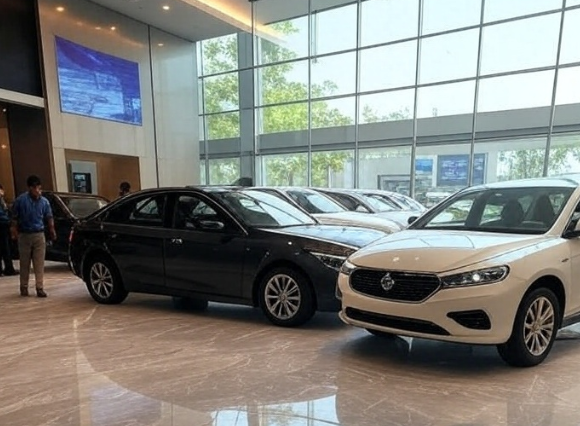
The global auto industry is reeling from the shockwaves triggered by China’s recent decision to restrict exports of rare earth elements, an essential component for modern automobile manufacturing—particularly electric vehicles (EVs). This sudden policy shift has exposed the industry's overdependence on China and has created a cascading impact across international markets, from production halts to potential price hikes. Let’s break down the crisis and what it could mean for the future of the auto sector.
Rare earth elements are critical in the production of EV motors, batteries, and other advanced automotive technologies. While various countries contribute to their extraction, China dominates the value chain. Approximately 60% of global rare earth production occurs in China, but more crucially, over 90% of the global refining capacity is also controlled by the country. This leaves other nations with little alternative but to rely on Chinese refineries even if they mine the raw materials themselves.
China’s decision to restrict rare earth exports is widely seen as a strategic response to increasing geopolitical tensions, particularly with the United States. With multiple trade restrictions and tariffs already in play from the U.S. side, China’s move signals a strong message—that it holds substantial leverage in sectors reliant on these critical elements. In doing so, China effectively reminded the world, especially U.S. industries, of the depth of its control over essential supply chains.
The ripple effects of this move have hit the auto sector the hardest. Though the full-scale impact isn't immediately visible, many in the industry are surviving on the hope that China might resume exports within a month. If not, the situation could become drastically worse. Automakers globally, including in India, are beginning to feel the squeeze. Companies like Maruti Suzuki have already suspended production of certain models such as the Swift, citing a lack of rare earth supplies. Similarly, electric vehicle production in India is facing severe disruptions.
Maruti Suzuki has admitted challenges in producing EVs due to the rare earth crisis, while Bajaj Auto has flagged potential production cuts if the supply situation doesn't normalize soon. TVS Motor has also issued a warning, indicating possible stalling of EV production lines. All these developments point to a sector operating in panic mode, waiting anxiously for policy clarity from China.
The current stock of rare earth materials held by many companies is expected to last only until the end of June. If the restrictions persist beyond that, production will need to be slashed, leading to fewer vehicles available in the market. As supply dwindles while demand remains constant or even increases, the inevitable outcome will be rising vehicle prices. Automakers like Bajaj have already flagged this concern, cautioning that unless the export ban is lifted or alternate sources are secured, production cuts and price hikes will commence as early as July.
Even European automakers aren’t spared. Their reliance on Chinese rare earths means they're also facing production slowdowns. Day by day, Europe's auto sector appears to be declining under the strain of this supply bottleneck.
In response to this growing crisis, Indian Commerce and Industry Minister Piyush Goyal commented that while the current situation is certainly a wake-up call, it also represents an opportunity. India is actively working on identifying and developing alternative supply chains and refining capabilities, though this is a long-term endeavor. Goyal stressed that the government is taking the situation seriously but believes the impact on the auto industry will likely be short-term.
However, many industry experts argue that time is of the essence. Alternative sources and refining capacities can't be built overnight. Some companies have mentioned that even if they begin the process now, it could take up to 60 days to see any results, and there's no guarantee that China will ease the restrictions in that time. The uncertainty is weighing heavily on operations and planning for the months ahead.
Meanwhile, China appears to be open to conditional cooperation. The country has started issuing licenses for rare earth usage and plans to track how and where these elements are utilized. One key stipulation: they must not be used in defense-related manufacturing. This requirement seems squarely aimed at the United States, further underlining the geopolitical undertones of the current crisis.
The most concerning part of this situation is that it isn’t rooted in any internal corporate issue or management flaw. It’s a geopolitical decision with industry-wide consequences, making it an external shock that affects all players equally—whether it’s Bajaj, Tata Motors, Maruti, TVS, Ather, or Ola. Every company is grappling with the same uncertainty, and unless a breakthrough in negotiations occurs, this shared struggle could severely dent the global automotive landscape.
The auto sector’s performance in the coming months will largely hinge on developments in the India-China dialogue and the global community’s ability to diversify away from China’s rare earth monopoly. As it stands, the situation is fluid, the pressure is mounting, and the future remains uncertain.
Disclaimer:
The information provided in this article is intended for general informational purposes only and is based on publicly available sources and commentary at the time of writing. While every effort has been made to ensure accuracy, the content may not reflect the most recent developments or official statements. Readers are advised to verify details independently and consult with experts or official sources for any business or investment decisions. The article does not intend to defame any company, country, or individual and should not be interpreted as financial or geopolitical advice.




